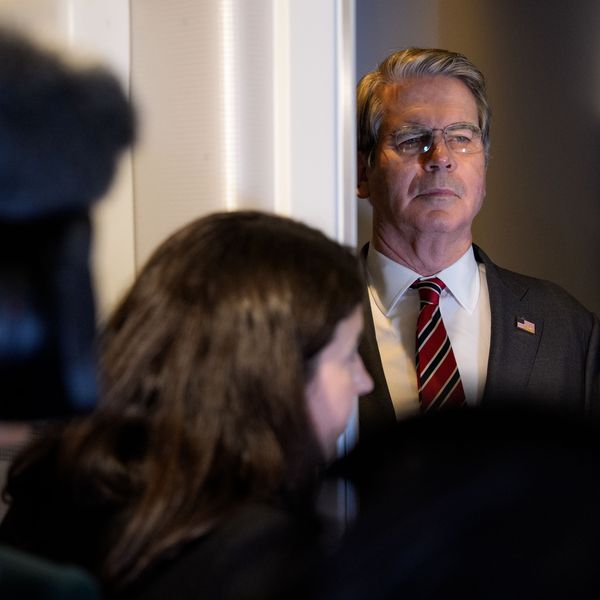
New York Attorney General Letitia James speaks during a Martin Luther King Jr. Day event at National Action Network House of Justice in New York City on January 16, 2023.
NY AG Proposes New Rules to Stop Corporate Price Gouging
Democratic New York Attorney General Letitia James said her proposal "will bolster our efforts to crack down on price gouging and ensure that large corporations do not take advantage of New Yorkers during difficult times."
Citing the "soaring cost of essentials" that have "pushed hardworking New Yorkers to the brink," Democratic New York Attorney General Letitia James on Thursday proposed rules to strengthen enforcement of the state's anti-price gouging law.
James' office said the new rules would "make it more straightforward to investigate and combat price gouging by setting clear guardrails against price increases during emergencies."
The rules would "clarify that a price increase over 10% during an abnormal market disruption may constitute price gouging."
"When times get tough, New Yorkers can trust that my office will always have their back."
Furthermore, corporations with more than 30% market shares would be prohibited from increasing profit margins during abnormal market disruptions. Limits would be placed on dynamic pricing—when the cost of a good or service varies due to market conditions—and protections would be extended to "vital and necessary" products and services after market disruptions.
"The rules proposed by my office will bolster our efforts to crack down on price gouging and ensure that large corporations do not take advantage of New Yorkers during difficult times," explained James, who last year launched a probe into Big Oil price gouging.
"When times get tough, New Yorkers can trust that my office will always have their back," she added.
\u201cOur proposals include:\n\n- Setting a specific threshold for price increases of essential goods during an emergency.\n\n- Creating guardrails for companies that rely on dynamic pricing.\n\n- Making companies show their costs to justify price increases.\n\nMore:\n\nhttps://t.co/aod7AGtgHU\u201d— NY AG James (@NY AG James) 1677767550
According to the Albany Times Union:
At least 10 states, including New Jersey and California, use the 10% threshold that James' office is proposing as setting the legal threshold for what qualifies as price gouging in New York. Others use higher thresholds, like Pennsylvania at 20%. (New York City has a 10% standard already on the books.)
If adopted, the 10% threshold is intended to provide clarity both from a legal lens and to business owners. It would in effect define the current standard for price gouging, which is "unconscionably excessive." Laws against price gouging in New York began in 1979, which followed a drop in production of oil after the Iranian revolution that then contributed to a spike in oil prices.
Corporations have used the Covid-19 pandemic, Russia's invasion of Ukraine, and inflation as pretexts to price gouge consumers.
"Price increases of necessary items during emergencies are unacceptable and illegal," New York state Sen. Kevin Thomas (D-6) said in a statement. "The responses to certain supply chain and market disruptions during the Covid-19 pandemic by companies made it clear that stronger enforcement of New York's price gouging statute was needed."
\u201cHUGE NEWS from @NewYorkStateAG on new proposed rules to crack down on price gouging and hold accountable big corporations who take advantage of market disruptions & emergencies to jack up prices.\n\nNow onto other states to follow her lead!\u201d— Groundwork Collaborative (@Groundwork Collaborative) 1677770520
Rakeen Mabud, chief economist at the Groundwork Collaborative, applauded James "for protecting consumers and cracking down on the corporations that have been taking advantage of families and small businesses for far too long."
"The proposed rules will directly target big corporations that have been jacking up prices on essential goods to boost their bottom line," Mabud added. "States and policymakers across the country should take note of Attorney General James' proposal and work to protect consumers from exploitative corporate behavior."
An Urgent Message From Our Co-Founder
Dear Common Dreams reader, The U.S. is on a fast track to authoritarianism like nothing I've ever seen. Meanwhile, corporate news outlets are utterly capitulating to Trump, twisting their coverage to avoid drawing his ire while lining up to stuff cash in his pockets. That's why I believe that Common Dreams is doing the best and most consequential reporting that we've ever done. Our small but mighty team is a progressive reporting powerhouse, covering the news every day that the corporate media never will. Our mission has always been simple: To inform. To inspire. And to ignite change for the common good. Now here's the key piece that I want all our readers to understand: None of this would be possible without your financial support. That's not just some fundraising cliche. It's the absolute and literal truth. We don't accept corporate advertising and never will. We don't have a paywall because we don't think people should be blocked from critical news based on their ability to pay. Everything we do is funded by the donations of readers like you. Will you donate now to help power the nonprofit, independent reporting of Common Dreams? Thank you for being a vital member of our community. Together, we can keep independent journalism alive when it’s needed most. - Craig Brown, Co-founder |
Citing the "soaring cost of essentials" that have "pushed hardworking New Yorkers to the brink," Democratic New York Attorney General Letitia James on Thursday proposed rules to strengthen enforcement of the state's anti-price gouging law.
James' office said the new rules would "make it more straightforward to investigate and combat price gouging by setting clear guardrails against price increases during emergencies."
The rules would "clarify that a price increase over 10% during an abnormal market disruption may constitute price gouging."
"When times get tough, New Yorkers can trust that my office will always have their back."
Furthermore, corporations with more than 30% market shares would be prohibited from increasing profit margins during abnormal market disruptions. Limits would be placed on dynamic pricing—when the cost of a good or service varies due to market conditions—and protections would be extended to "vital and necessary" products and services after market disruptions.
"The rules proposed by my office will bolster our efforts to crack down on price gouging and ensure that large corporations do not take advantage of New Yorkers during difficult times," explained James, who last year launched a probe into Big Oil price gouging.
"When times get tough, New Yorkers can trust that my office will always have their back," she added.
\u201cOur proposals include:\n\n- Setting a specific threshold for price increases of essential goods during an emergency.\n\n- Creating guardrails for companies that rely on dynamic pricing.\n\n- Making companies show their costs to justify price increases.\n\nMore:\n\nhttps://t.co/aod7AGtgHU\u201d— NY AG James (@NY AG James) 1677767550
According to the Albany Times Union:
At least 10 states, including New Jersey and California, use the 10% threshold that James' office is proposing as setting the legal threshold for what qualifies as price gouging in New York. Others use higher thresholds, like Pennsylvania at 20%. (New York City has a 10% standard already on the books.)
If adopted, the 10% threshold is intended to provide clarity both from a legal lens and to business owners. It would in effect define the current standard for price gouging, which is "unconscionably excessive." Laws against price gouging in New York began in 1979, which followed a drop in production of oil after the Iranian revolution that then contributed to a spike in oil prices.
Corporations have used the Covid-19 pandemic, Russia's invasion of Ukraine, and inflation as pretexts to price gouge consumers.
"Price increases of necessary items during emergencies are unacceptable and illegal," New York state Sen. Kevin Thomas (D-6) said in a statement. "The responses to certain supply chain and market disruptions during the Covid-19 pandemic by companies made it clear that stronger enforcement of New York's price gouging statute was needed."
\u201cHUGE NEWS from @NewYorkStateAG on new proposed rules to crack down on price gouging and hold accountable big corporations who take advantage of market disruptions & emergencies to jack up prices.\n\nNow onto other states to follow her lead!\u201d— Groundwork Collaborative (@Groundwork Collaborative) 1677770520
Rakeen Mabud, chief economist at the Groundwork Collaborative, applauded James "for protecting consumers and cracking down on the corporations that have been taking advantage of families and small businesses for far too long."
"The proposed rules will directly target big corporations that have been jacking up prices on essential goods to boost their bottom line," Mabud added. "States and policymakers across the country should take note of Attorney General James' proposal and work to protect consumers from exploitative corporate behavior."
Citing the "soaring cost of essentials" that have "pushed hardworking New Yorkers to the brink," Democratic New York Attorney General Letitia James on Thursday proposed rules to strengthen enforcement of the state's anti-price gouging law.
James' office said the new rules would "make it more straightforward to investigate and combat price gouging by setting clear guardrails against price increases during emergencies."
The rules would "clarify that a price increase over 10% during an abnormal market disruption may constitute price gouging."
"When times get tough, New Yorkers can trust that my office will always have their back."
Furthermore, corporations with more than 30% market shares would be prohibited from increasing profit margins during abnormal market disruptions. Limits would be placed on dynamic pricing—when the cost of a good or service varies due to market conditions—and protections would be extended to "vital and necessary" products and services after market disruptions.
"The rules proposed by my office will bolster our efforts to crack down on price gouging and ensure that large corporations do not take advantage of New Yorkers during difficult times," explained James, who last year launched a probe into Big Oil price gouging.
"When times get tough, New Yorkers can trust that my office will always have their back," she added.
\u201cOur proposals include:\n\n- Setting a specific threshold for price increases of essential goods during an emergency.\n\n- Creating guardrails for companies that rely on dynamic pricing.\n\n- Making companies show their costs to justify price increases.\n\nMore:\n\nhttps://t.co/aod7AGtgHU\u201d— NY AG James (@NY AG James) 1677767550
According to the Albany Times Union:
At least 10 states, including New Jersey and California, use the 10% threshold that James' office is proposing as setting the legal threshold for what qualifies as price gouging in New York. Others use higher thresholds, like Pennsylvania at 20%. (New York City has a 10% standard already on the books.)
If adopted, the 10% threshold is intended to provide clarity both from a legal lens and to business owners. It would in effect define the current standard for price gouging, which is "unconscionably excessive." Laws against price gouging in New York began in 1979, which followed a drop in production of oil after the Iranian revolution that then contributed to a spike in oil prices.
Corporations have used the Covid-19 pandemic, Russia's invasion of Ukraine, and inflation as pretexts to price gouge consumers.
"Price increases of necessary items during emergencies are unacceptable and illegal," New York state Sen. Kevin Thomas (D-6) said in a statement. "The responses to certain supply chain and market disruptions during the Covid-19 pandemic by companies made it clear that stronger enforcement of New York's price gouging statute was needed."
\u201cHUGE NEWS from @NewYorkStateAG on new proposed rules to crack down on price gouging and hold accountable big corporations who take advantage of market disruptions & emergencies to jack up prices.\n\nNow onto other states to follow her lead!\u201d— Groundwork Collaborative (@Groundwork Collaborative) 1677770520
Rakeen Mabud, chief economist at the Groundwork Collaborative, applauded James "for protecting consumers and cracking down on the corporations that have been taking advantage of families and small businesses for far too long."
"The proposed rules will directly target big corporations that have been jacking up prices on essential goods to boost their bottom line," Mabud added. "States and policymakers across the country should take note of Attorney General James' proposal and work to protect consumers from exploitative corporate behavior."

